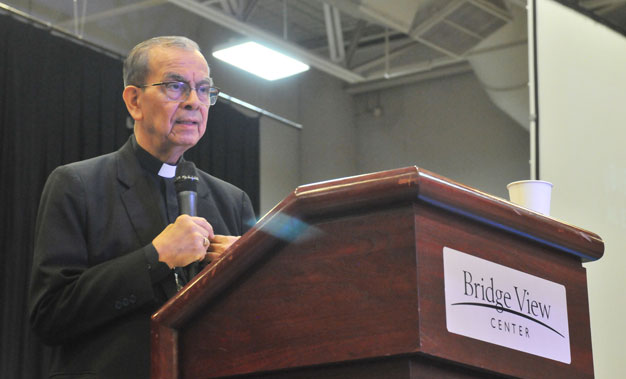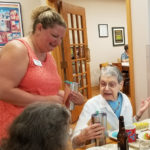
Cardinal Gregorio Rosa Chavez speaks during a multicultural ministry event at Bridge View Center in Ottumwa June 11.
By Barb Arland-Fye
Editor
After Evening Prayer in her community’s Magnificat Chapel, Sister Johanna Rickl, CHM, asked Cardinal Gregorio Rosa Chavez of El Salvador to share with the sisters in attendance “the experiences that speak to your heart about St. Oscar Romero.”
Cardinal Rosa Chavez, who was in Iowa to speak at a conference for Spanish-speaking Catholics, told the Congregation of the Humility of Mary sisters in Davenport that he was 14 years old when he first met the future saint. Later as a seminarian, Rosa Chavez served as assistant to then-Father Romero at the minor seminary in El Salvador where he was the rector.
Seven years after his ordination in 1970, Father Rosa Chavez became director of the communications office for the newly installed Archbishop Romero. Three years later, gunmen killed the archbishop as he celebrated Mass in the chapel of a cancer hospital in San Salvador where he lived.
Cardinal Rosa Chavez, 79, told the sisters that he and Archbishop Romero became friends at the minor seminary. The priest he knew then changed from conformist to reformist when he became Archbishop Romero. While others wondered about the change, Cardinal Rosa Chavez described it as an evolution. Archbishop Romero realized he could not stand by while the poor, oppressed people of his country suffered. He knew he needed to be working for justice; he accepted but did not welcome the possibility of death because of his public stand. He believed that God expected a heroic response, the cardinal said.
When Archbishop Romero delivered a homily in March 1980 telling soldiers to stop the killing of their brothers and sisters and to stop the repression of the people, Cardinal Rosa Chavez knew the archbishop had sealed his fate. “I thought, ‘this is the sentence to death.’ The next day they killed him.”
Cardinal Rosa Chavez spoke about other things with the sisters, including his admiration for women religious and their work on behalf of the poor and oppressed. He knew the four churchwomen murdered the same year in El Salvador as Archbishop Romero. They lost their lives for taking the side of the poor. The cardinal, too, stands for the poor.
I followed Cardinal Rosa Chavez and the sisters down to the dining room for supper, hoping to learn more about Archbishop Romero. What was it like to work with him and to be his friend? As he finished his meal, the cardinal took time to talk with me. Father Rudolph Juarez of St. Anthony Parish in Davenport assisted with translation.
Cardinal Rosa Chavez said he witnessed the young Father Romero speaking at the cathedral and hearing confessions, which made a big impression on him as a boy. Later, as assistant to Father Romero at the seminary, “That’s when we became friends.”
Father Romero “was a person of difficult character, very demanding of people and just as demanding of himself,” Cardinal Rosa Chavez said. Why did you become friends? I asked. “Because he found in me someone of confidence, mutual sympathies. So he liked to share his thoughts with me.” Those thoughts included Father Romero’s ideals and his projects for spiritual life, the cardinal said.
When Archbishop Romero was installed as archbishop in 1977, Father Rosa Chavez was rector of a national seminary for El Salvador. The archbishop needed a place to live temporarily and asked Father Rosa Chavez if he could stay at the seminary. “I said, ‘my pleasure.’” Shortly afterwards, Archbishop Romero moved into his own, three-room home.
Every Sunday, the priest listened to Archbishop Romero’s homilies and took notes, including the day before the archbishop’s last day on earth. “I felt pain in my heart,” Cardinal Rosa Chavez recalled, thinking the homily would cost the archbishop his life.
The next day, after celebrating Mass at the seminary, he learned that Archbishop Romero had been shot. “It was by the grace of God that he should die at the altar and not on the street,” the cardinal told me.
(Contact Editor Barb Arland-Fye at arland-fye@davenportdiocese.org)











